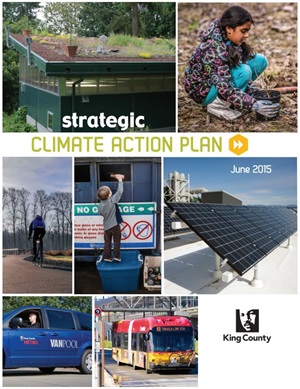Executive delivers bold new plan to confront climate change after hottest June on record
Summary
The 2015 Strategic Climate Action Plan will serve as King County's road map to achieve ambitious targets to reduce greenhouse-gas emissions that were adopted with King County’s 39 cities last July.
Story
After the hottest June in our region's history, with record-low river flows and growing threats of wildfires, King County Executive Dow Constantine transmitted his five-year action plan on climate change to the King County Council.
“From hotter, dryer summers, to shrinking winter snowpack, climate change is already impacting the environment, health, economy, and quality of life in King County,” said Executive Constantine.
“Pledges and good intentions won’t get us to our climate goals or meet our commitment to future generations. The Strategic Climate Action Plan maps out clear targets and priority actions to address climate change in collaboration with our cities, energy providers, businesses, and residents.”
The 2015 Strategic Climate Action Plan will serve as King County's road map to achieve ambitious targets to reduce greenhouse-gas (GHG) emissions that were adopted with King County’s 39 cities last July. It also outlines what King County will do to help prepare the region for the impacts of climate change, and ensure that the County continues to lead by example.
The plan builds upon recent progress while outlining ambitious commitments and actions that will:
- Grow transit service through 2020 with no increase in operational GHG emissions.
- Double transit ridership by 2040.
- Achieve a 70 percent recycling rate in the King County solid waste service area by 2020.
- Partner with utilities and others to phase out coal-fired electricity by 2025 and increase development of renewable energy resources.
- Use 100 percent GHG-neutral electricity in government operations by 2025.
- Plant at least one million trees in King County by 2020 in cooperation with public and private partners.
- Permanently conserve remaining high-priority farm, forest, and other open spaces throughout King County within 30 years.
- Work regionally to prepare for climate change impacts associated with County services such as wastewater treatment, stormwater, emergency management, public health, roads, flood risk reduction, and salmon recovery.
The plan will be considered this summer for adoption by the King County Council.
Climate change is one of the paramount challenges of our generation
In King County, climate change affects natural resources such as salmon and forests as well as public health challenges associated with heat and wildfire, and economic impacts related to increasingly extreme weather and flood risks.
The Strategic Climate Action Plan builds on King County’s long track record of innovation, leadership, and investment in reducing greenhouse gas emissions and preparing for the impacts of climate change. For example:
- Since 2010, investments in energy efficiencies have reduced energy use in County buildings by more than 15 percent, generating over $3 million in annual savings.
- Metro Transit has pioneered the use of hybrid bus technology, and King County is on track to have an all-hybrid or electric bus fleet by 2018.
- The County is now producing renewable energy equivalent to 57 percent of its government operational energy needs.
- King County and 10 local cities that are part of the King County-Cities Climate Collaboration (K4C) represent two-thirds of the County’s 2 million residents and have adopted ambitious joint commitments to reduce greenhouse gas emissions.
- Over the last decade, King County's Wastewater Treatment Division has been planning for the impacts of climate change, including sea level rise and increasing flood risks, on its infrastructure and operations.
The plan also advances King County’s commitment to equity and social justice
For example, investing in expanded commuter options and weaving together transit with land use will reduce GHG emissions while improving access to work, education, and health care.
As highlighted throughout the 2015 SCAP, King County recognizes that partnership is essential for the success of combatting climate change and is calling on the region’s public, private, and civic sectors to also take action.
Read the King County 2015 Strategic Climate Action Plan at kingcounty.gov/climate.
FOR MORE INFORMATION, CONTACT:
Chad Lewis, Executive Office, 206-263-1250
 Translate
Translate


